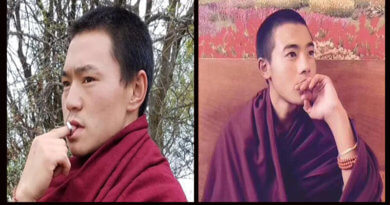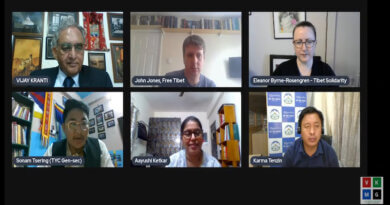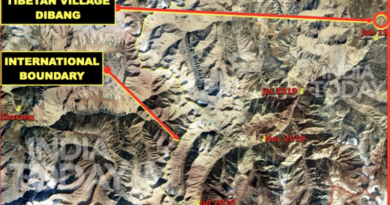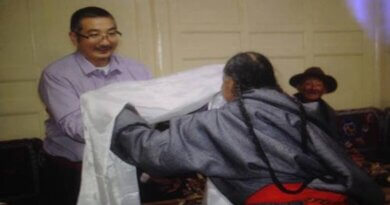ARUNACHAL PRADESH IN INDIA AND TIBET UNDER CHINA’S CONTROL – CONTRAST IN APPROACH BETWEEN INDIA AND CHINA
By: N.S.Venkataraman
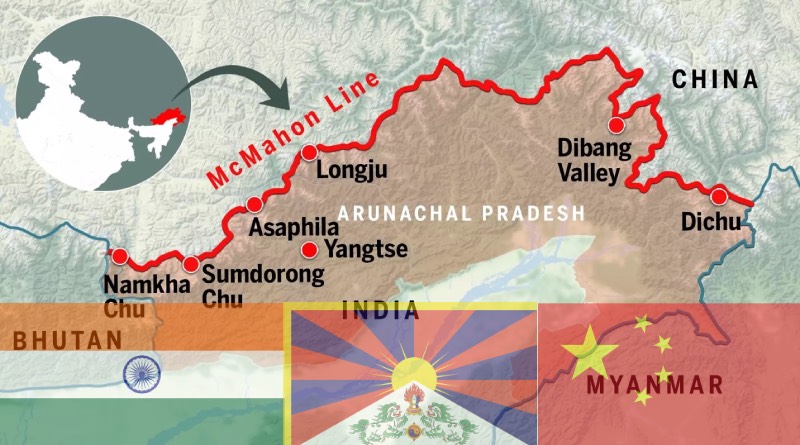
China, which is now well known for its territorial expansion greed, has territorial disputes with neighbouring countries regarding South China Sea, Falkland Islands and others. Several neighbouring countries including the Philippines, Japan, Vietnam are extremely upset about China’s aggressive territorial claims.
China’s claim on Taiwan
China is claiming that Taiwan should be part of mainland China. The ground reality is that the internal civil war was fought between the Chinese Communist Party (CCP) and the Nationalist Party (Kuomintang) from 1927 to 1949, and ended with the CCP, led by Mao Zedong, establishing the People’s Republic of China in 1949. The Nationalists, under Chiang Kai-shek, retreated to Taiwan and maintained their government there, and Taiwan has emerged as independent nation, as Chinese communists could not occupy Taiwan.
If China can claim that Taiwan should be part of it, Taiwan too can claim in equal measure that mainland China should be under its control.
China’s occupation of Tibet
Several decades back, China occupied Tibet aggressively, massacred several thousand protesting Tibetans, and forced the Tibetan freedom fighters and His Holiness the Dalai Lama to leave their motherland Tibet and seek refuge in India. The vicelike grip of China over Tibet continues till today and several countries including India have ignored the plight of Tibetans who have lost their country.
Most of the countries in the world now seem to be accepting China’s occupation of Tibet. In short, the world’s conscience has remained silent as far as present Tibet’s present misery is concerned.
China’s claim on Arunachal Pradesh
By way of continuing its policies for territorial expansion, China claims that Arunachal Pradesh in India should be part of China. India is protesting about China’s claims but China seem to remain unconcerned about India’s protest in the matter.
Recently, an Indian citizen from Arunachal Pradesh was detained at the Shanghai International Airport in China, as Chinese officials refused to recognise the Indian passport. To add insult to injury, the Chinese government justified such action in detaining the person from Arunachal Pradesh, stating that It cannot accept Indian passport for a person from Arunachal Pradesh, as in China’s view, Arunachal Pradesh is part of China. China has gone to the extent of stating that the actions taken by the Chinese immigration officials were as per law and regulations in China.
Contrast in approach between India and China
While China has deliberately provoked India now by such action, India has only protested and has taken no further steps to make China behave and refrain from claiming India’s territory. While China is conducting itself in such manner, India seems to be ignoring such irksome behaviour by China and is maintaining close relationship with China in trade and diplomatic level. At the moment, it looks like China has the last laugh.
While China is so aggressive in its territorial claims on Arunachal Pradesh and is presently occupying thousands of kilometres of Indian territory that it annexed during the 1962 war with India, India’s attitude with regard to China’s aggression in Tibet is in sharp contrast.
China’s occupation of Tibet is not only unethical, it is not in conformity with the internationally accepted relationship pattern between countries. Additionally, China’s occupation of Tibet has now become a threat to India’s security. China is constructing a huge military air base in Tibet, which can be a threat to India, if China were to decide to use force to annex Arunachal Pradesh. Further, China is constructing a huge dam in Tibet that would block the flow of water to the northeastern states in India, which may cause serious socioeconomic problems in India. So far, the Indian government has not expressed its serious concern about China constructing a military air base and constructing a dam in Tibet. The Government of India’s approach to China on such matters of concern seems to be one of deafening silence.
Millions of people in India are very unhappy about India’s soft stand towards China with regard to China’s occupation of Tibet. Many people think that India must be much more aggressive in dismissing China’s claim on Arunachal Pradesh. In such matters, the widespread view in India is that India’s approach is only defensive, which will not deter China in any way.
What strategies?
It is true that China is now an economic superpower and maintains large military strength with considerable advancements in technology. Obviously, such strength has made China to treat its neighbouring countries with disdain. China appears to think that it can have its way unchallenged in claiming the territories of other countries.
Today, several countries in the world including the USA and the European Union do not want to cross China or get on its wrong side, as they want to maintain strong trade relations with China. Whatever may be the attitude of other countries, China’s neighbouring and nearby countries like India, the Philippines, Vietnam and Japan need to take some steps to protect their interests against China’s territorial greed.
Even while recognising China’s economic and military strength with its vast market potential, the neighbouring countries facing aggressive territorial claims need to organise themselves and evolve some effective strategies to checkmate China.

Possibly, questioning China’s aggressive and unjustified occupation of Tibet, is one sure way to force China into a defensive mode. This may make China mend its ways and give up its territorially aggressive behaviour against its neighbouring countries.
Venkataraman is a trustee with the “Nandini Voice for the Deprived,” a not-for-profit organisation that aims to highlight the problems of downtrodden and deprived people and supports their cause. To promote probity and ethical values in private and public life and to deliberate on socio-economic issues dispassionately and objectively.
The views expressed in this article are those of the author and should not be attributed to Tibet Express.

